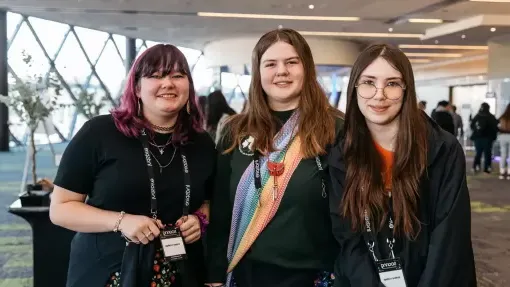
Article
Renewing our commitment to Indigenous students across Canada
A day of reflection, education and acknowledgment across Canada, National Day for Truth and Reconciliation (NDTR) on 30 September honours the survivors of residential schools and their families. It is an opportunity for all Canadians and the global community to reflect on the past and acknowledge the steps required to heal, rebuild and strengthen ties with Indigenous Peoples. Wood recognises the importance of this day and the role it plays in our ongoing commitment to reconciliation and education.
NDTR, established in Canada in 2021 following the Truth and Reconciliation Commission’s (TRC) recommendations, acknowledges the legacy of the residential school system. Thousands of Indigenous children were taken from their families, enduring trauma that continues to affect communities today. The orange shirt, now a powerful symbol of the movement, originated from survivor Phyllis Webstad’s story of her new orange shirt being taken from her on her first day at residential school. It is a reminder that “Every Child Matters.”
For Wood, NDTR is a significant time to engage in reflection and action. Since 2021, the Indigenous engagement team alongside Canadian leadership, guides our Canadian offices’ efforts to educate our employees, support Indigenous communities and amplify the voices and stories of those impacted by residential schools. As an organisation with a strong presence across Canada, we embrace our responsibility to foster understanding and contribute to meaningful change on our journey of reconciliation.
This year, Wood organised several cross-country events in our Canadian offices, encouraging employees to start and continue their exploration and understanding of reconciliation. These events included proudly wearing orange shirts in solidarity with Indigenous communities and residential school survivors; traditional beading workshops to honour Canada’s Missing and Murdered Indigenous Women, Girls, and Two-Spirit People (MMIWG2S+), creating space for discussions about cultural traditions, healing and advocacy for justice; and a special screening of an Indigenous-directed film highlighting the strength, resilience and rich culture of Indigenous Peoples. By exploring both historical and modern narratives, employees gained deeper insight into the challenges Indigenous communities have faced—and continue to overcome.
Wood’s dedication to reconciliation goes beyond a single day. Through our Indigenous relations strategy and leadership commitment, we focus on fostering long-term relationships, investing in education and supporting community-driven initiatives. The Indspire bursary program is one way we actively support Indigenous students, ensuring that educational opportunities are available to all.
“Reconciliation is not a one-time action—it is an ongoing process that requires continuous learning, reflection and collaboration,” said Kahsha Patterson, Indigenous Policy and Program Lead at Wood. “At Wood, we are committed to doing the work needed to build meaningful partnerships with Indigenous communities and to contribute to the healing journey.” Our actions on NDTR reflect the values that guide our approach to Indigenous engagement throughout the year. From corporate partnerships with Indigenous businesses to employee-led initiatives, we aim to create lasting impact through education, economic empowerment and respectful collaboration. Since 2020, Wood has spent over $329 million in revenue with Indigenous businesses, demonstrating the depth of our commitment to community growth and development.
The events leading up to and around NDTR offered our staff an opportunity to expand their understanding of reconciliation. “Attending the various events and speaker sessions hosted by Kahsha and her team throughout the year has been eye-opening,” said Terence Jellema, Director of Midstream, Downstream and Petrochemicals. “Learning about Indigenous culture from their perspective deepened my awareness of Canada’s history and reinforced the importance of supporting these communities, not just today, but always.”
These reflections underscore the importance of education and engagement in our reconciliation journey. By creating spaces for dialogue and learning, Wood supports an environment where employees can explore and understand these complex and critical issues.
As we look to the future, Wood remains dedicated to the Calls to Action from the TRC. “We believe that through ongoing education, investment and community engagement, we can contribute to a future built on respect, trust and understanding,” says Patterson.
Reconciliation requires all of us to participate in meaningful ways. We encourage our employees, partners and the broader community to continue learning, reflecting and taking action to support Indigenous communities, culture and history.













